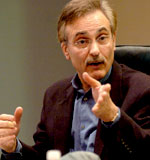« Home | Redheads are hot in search this week »
Up Close FMQB Interview With John Parikhal
 Joint Communications CEO John Parikhal is featured in an upcoming issue this month in FMQB -- a leading source for radio and music industry news.
Joint Communications CEO John Parikhal is featured in an upcoming issue this month in FMQB -- a leading source for radio and music industry news.
Periodically, FMQB likes to check in with John for his point of view on the state of radio and media to give a "look forward" peak at future trends, opportunities and developing problems. The upcoming full interview covers a wide range of issues, including the impact of Howard Stern move to satellite radio, HD Radio, mega-corporate radio, new music for teens, and much more. They've released early excerpts as they go Up Close:
Among the highlights:
FMQB: Both the music and radio industries have been out of alignment with the younger consumer, an increasing trend over the past ten years. What are the inherent problems with the disconnection?
Parikhal: It's the perfect storm syndrome. Had the technology not come along, you would have radio sliding a little bit less and you would have had the old record business still hanging on. Part of the disconnection has always been there...With digitization it suddenly became possible to hear a whole bunch of music...you didn't have to rely on radio.
FMQB: How did radio consolidation influence the music industry model?
Parikhal: The traditional relationship between radio and labels eroded.
FMQB: Has radio leadership given up on targeting the younger demo?
Parikhal: As recently as three or four years ago I was talking to some of the more senior people at radio companies. Literally their words were, "We don't care about teenagers. We can't make enough money from them. We don't care."...radio became basically like the slaughterhouse, a pork belly or commodities business, where it was all about moving numbers. They didn't care about planting new ground. I kept asking people, 'If you have five stations in a cluster, why don't you program one just for teens?' None of them wanted to do it...Now of course the consequences are being felt.
FMQB: Where is the next generation of radio consumers going to come from? What does this do to radio's intermediate to long-term future?
Parikhal: They are there, but they don't care about the medium other than as a utility. As my 14-year-old daughter and all of her friends said when I did a little focus group with them: "Radio just sucks." I said, "Well, I see you listening to it from time to time." They responded, "Yeah, when there's nothing I want to hear on the iPod. I'll hit the buttons on the stations, but usually there's nothing there, and then we just turn it off and go to the computer." That's what we're seeing with a lot of younger teens. Radio has a real perceptual problem with today's youth and it will present a problem down the road if it is not aggressively attacked today...Fact is, though, radio's not going to die overnight. There are hundreds of millions of radios in cars, homes and work places, and people are still going to listen to them.
FMQB: What is your take on HD radio?
Parikhal: HD is a technology for which there is no real clear demand...What they really want is fewer commercials, fewer interruptions, and more music, or more Talk on the Talk side.
FMQB: Is HD indeed a credible replacement technology for the traditional product?
Parikhal: If you look at what I call the technology adoption curve, replacement technologies generally take somewhere between ten and fifteen years to fully work their way through the system. What I call add-on technologies, something I can plug into an exiting product, generally take seven to ten. For example, VCR and DVD players are add-on technologies. You simply plug them into your TV and they work; you don't have to do anything else. So, the adoption of the DVD player (we're into the seventh year) is pretty well finished because it was just a plug-in. On the other hand, HD television, a replacement technology, has taken a heck of a lot longer to find its way through the system, and still isn't fully through the system. HD radio is really a replacement technology.
FMQB: You sound like you have major issues with the consolidation model in general.
Parikhal: If you look at the consolidation model from day one...our argument was that you probably should never own more than four radio stations in a market for a couple of reasons. One of them was you could never accomplish your fundamental goals across the board. Nearly everyone wants to be top five. That's basically the goal: top five 25-54, or top five 18-34. That's kind of the holy grail of making buckets of money. If you own more than four or five stations, you can no longer do that, which means you're playing not to lose instead of playing to win. Playing not to lose is eventually a failure strategy. It might take a really long time, but you will eventually fail if you play not to lose. You have to play to win. There are no exceptions. It's what motivates the best competitors.
There's lots more to digest from the interview here. What are your thoughts? We welcome your comments.
(excerpts re-published with permission from fmqb.com)
posted by Unknown @ Friday, May 12, 2006,
![]()
![]()















